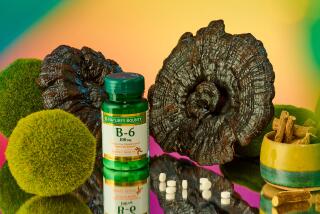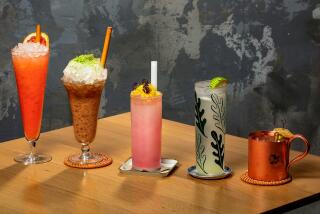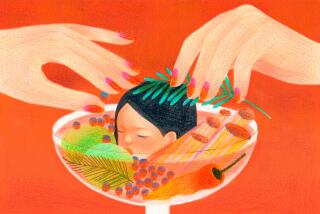Four Loko incident in Washington state raises alarm about caffeinated alcoholic drinks
- Share via
Reporting from Seattle — Even by the extreme standards of typical college mayhem, the small-town college party in central Washington this month looked bad.
Police were initially called to a supermarket parking lot, where they found a girl passed out in the back seat of a car next to a boy with a bloody nose. At the private house the two had just left, three girls were sprawled on a bed, a barely conscious young man was being dragged out of the backyard, a girl was prostrate on the bathroom floor and three young people were splayed senseless in a car outside.
The scene was so bizarre that that many partygoers, most of them students at Central Washington University in nearby Ellensburg, believed they had fallen victim to a date rape drug.
Instead, police and medical investigators have in large part blamed the heavy consumption of Four Loko, also known as “blackout in a can,” for the chaotic scene of sickened young people.
The 23 ½-ounce can of fruity malt liquor sold in Washington and many other states packs 12% alcohol, the equivalent of drinking four or more beers and a cup of strong coffee. Vodka, rum and other alcoholic drinks also had been consumed, investigators said.
College officials and law enforcement agencies throughout the country are increasingly sounding alarms against Four Loko and others like it, which they say are little more than a binge drinker’s dream.
This week Central Washington University officials announced they are temporarily banning the brews on campus. New Jersey’s Ramapo College announced a similar ban after a surge in alcohol intoxication cases since the beginning of the school year, with about half a dozen of involving Four Loko. And the Food and Drug Administration is investigating whether caffeine and alcohol can safely be mixed and consumed as a single beverage.
Several attorneys general across the country, including California and Washington, have urged the FDA to move quickly. Washington Atty. Gen. Rob McKenna said Monday that barring national sales restrictions, he will seek a ban on caffeinated malt liquor beverages in his state.
“They’re marketed to kids by using fruit flavors that mask the taste of alcohol, and they have such high levels of stimulants that people have no idea how inebriated they really are,” he said.
The drink’s growing popularity took on an even darker overtone this month in New York, when one of three men abducted and tortured by gang members in the South Bronx said he was forced by his abductors to consume 10 cans of Four Loko.
The nine Central Washington University freshmen hospitalized after the Oct. 8 party had blood alcohol levels ranging from .123 to .35, with a concentration of .30 or more considered potentially fatal, officials said. All had consumed Four Loko, some in combination with other alcoholic beverages.
In New Jersey, “one of the students said he’d had three tins of this beverage Four Loko and several shots of tequila all in the space of an hour,” said Ramapo College President Peter Mercer. “His blood alcohol level was 0.4, which was five times the legal limit.”
The FDA has registered 27 manufacturers of caffeinated alcoholic beverages, from elite vodkas to fruit-flavored alcohol drinks with names like Liquid Charge, Max Fury and Torque, many of which also feature ingredients like ginseng, taurine and guarana, often described as stimulants.
At $2.50 a can, Four Loko has won an enthusiastic following among young partyers. A recent article in Yale University’s Daily News notes the beverage’s unofficial Facebook page — named “Four Lokos are blackouts in a can and the end of my morals” — has 74,680 fans, more than Hillary Clinton, Nelson Mandela and Christine O’Donnell combined.
“WARNING: You will remember absolutely nothing in the morning, probably acted like a slut, and possibly tried to fight someone. It’s a Four Loko thing,” the page warns.
A variety of YouTube videos show young people chugging the brightly colored cans and bopping to a growing variety of Four Loko theme songs that are now downloadable as MP3s and telephone ring tones.
Phusion Projects LLC of Chicago, which manufactures Four Loko, said in a statement it is “upset … when our products are abused or consumed illegally by underaged drinkers,” but emphasized it is wrong to place all the blame for the Washington incident on Four Loko because police found evidence that beer and hard liquor also had been heavily consumed.
“The events in central Washington this month were inexcusable. And most would expect our company to disagree with recent decisions to ban our products from college campuses… We do not. We agree with the goals that underlie those sentiments,” the company said.
Phusion officials also pointed out that consuming caffeine with alcohol is common, whether it’s having coffee after a meal with wine, or drinking a rum and Coke, an Irish coffee, or more commonly lately, a Red Bull energy drink with vodka.
In response to a 2008 lawsuit filed by the Washington, D.C.-based consumer advocacy group Center for Science in the Public Interest, two major manufacturers of caffeinated energy drinks, Anheuser-Busch and Miller Brewing Co., agreed to take their beverages off the market.
The lawsuit cited a study by the Wake Forest University School of Medicine, which found that young drinkers of so-called alcospeed beverages were more likely to binge drink, become injured, ride with an intoxicated driver or be taken advantage of sexually than drinkers of conventional alcoholic drinks.
“The real problem is the drinker thinks they’re more alert and less impaired than they actually are,” said David Schardt, senior nutritionist at the consumer advocacy group. “They keep drinking to the point of being in danger of alcohol poisoning. And that can lead to death.”
Few studies have been able to measure the physical effects of combining alcohol and caffeine, which is one of the areas the FDA is expected to examine before moving forward on any regulation.
“The increasing popularity of consumption of caffeinated alcoholic beverages by college students and reports of potential health and safety issues necessitates that we look seriously at the scientific evidence as soon as possible,” Joshua Sharfstein, principal deputy commissioner of food and drugs, said in a statement this week.
Ashley Stubbs, a 20-year-old junior who heads a network of upper-division college students who help mentor freshmen, said many students involved in the Oct. 8 party still don’t believe that simply drinking Four Lokos could have caused the devastating effects they experienced.
“There’s a feeling of disbelief that it’s just the caffeinated alcoholic beverages that caused this incident,” she said. “I would say that it’s really a small minority of kids at Central Washington that are putting themselves out and drinking excessively.”
More to Read
Sign up for Essential California
The most important California stories and recommendations in your inbox every morning.
You may occasionally receive promotional content from the Los Angeles Times.










